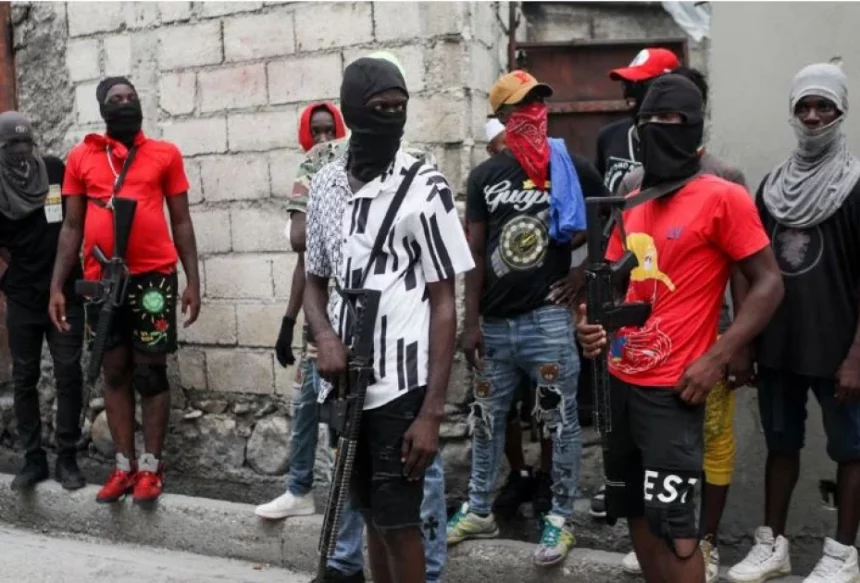The Kenya National Civil Society Centre (KNCSC) has raised concerns over the impending deployment of Kenya’s security forces to Haiti, citing non-compliance with the requirements of the Constitution and the law.
“Notoriety of the Kenya Police Service for human rights violations, including their dubious reputation for extra-judicial and arbitrary executions, and corruption makes them the least qualified for any deployment to Haiti as peace-keepers,” the lobby group said in a statement to newsrooms on Tuesday.
According to the civil society, Kenya has not met reinforcing principles of peace-keeping mission, especially by the United Nations.
“It is instructive that one of the leaders of the G9 Family and Allies Gang Alliance, Jimmy “Barbecue” Cherizier, has since warned any potential foreign force sent to Haiti against committing human rights abuses in the Caribbean nation. This means that the principle of consent of the parties to the conflict in Haiti has not been met, making it impossible to deploy the Kenya Police officers as part of the planned peace-keeping mission,” the body states.
KNCSC has threatened to seek legal redress from the high court, should the concerned authorities proceed with the deployment.
The statement by KNCSC comes after the United Nations (UN) Security Council voted on Monday on the resolution to see a non-UN multinational force led by Kenya, deploy its police officers to Haiti to combat gangs and restore security.
Following this approval, Kenya is expected to deploy its force to Haiti by January 2024, an area currently marred by gang violence with the capital Port-au-Prince, being the epicentre, for over a year.
In a press statement released on Tuesday, President William Ruto welcomed UN’s approval of the security mission.
“In our struggle, we always had friends, not an overwhelming multitude of powerful allies, yet nevertheless true, loyal and determined friends. The people of Haiti, our dear friends, today stand in need. It is our fundamental moral obligation to be their friend indeed, by standing with them,” Ruto said.
However, KNCSC has pointed out that according to Article 240 of the Constitution that among others, the procedure for deployment involves establishing the National Security Council in which the Inspector General is a member.
“While the President presides over meetings of the National Security Council as the Commander-in-Chief of the Defence Forces, it is the National Security Council that may, with the approval of Parliament, deploy any given number of the national forces outside Kenya,” KNCSC says.
The lobby has faulted the Kenya police for its continual use of excessive force, citing the “large number of extra-judicial killings and arbitrary execution of protesters in parts of Kenya during recent protests against high cost of living.”
On September 21, the agreement to deploy Kenyan soldiers to Haiti was signed by Minister Jean Victor Génus and Cabinet Secretary Alfred Mutua and witnessed by President William Ruto of Kenya and Haiti Prime Minister Ariel Henry at the Kenyan Mission in New York, United States.
There have been concerns about Kenya’s preparedness for the mission.
“Kenya is poorly prepared for that despite what some officials are telling us. There will be a language and cultural problem. The Haitians also don’t want us, the gangs are saying don’t come. And they are better armed than the forces there,” Macharia Munene, Professor of International Relations and History at USIU recently remarked.
Amnesty International through its representative to the UN wrote to members of the UN Security Council urging them to examine the human rights track record of Kenyan security forces.
“Any deployment of foreign security forces must include clear, mandatory and enforceable parameters to prevent the unlawful use of force, negligence resulting in harm to local populations, and any other abuses by any individuals deployed as part of any multinational effort; these must also include clear measures to protect individuals against sexual exploitation and abuse, “Amnesty International said.
The government, through Foreign Affairs Cabinet Secretary Alfred Mutua has taken steps to quell the concerns and explain the significance of the Haiti security mission.
“Kenya is one of the most sought-after nations for peacekeeping missions… It is because of Kenya’s stellar performance that the Government of Haiti requested Kenya to lead a police mission to help stabilise and bring order to their country,” Mutua said.
Inspector General of Police Japhet Koome, speaking at the Kenya School of Government on September 27, expressed his optimism about the success of the security operation.
“Yes, we’re going to Haiti. We will lead this mission. We have never failed. We’ll succeed there too,” Koome said.
President Ruto has termed this “a mission for humanity” and applauded the UN for its resolve, as it showcases Pan-African commitment to the continent’s unity together with the African Union’s policy of solidarity with the African Diaspora.
“The resolution marks an important moment in the history of global multilateralism… and affirms our shared hope that justice is finally coming to the people of Haiti.”



